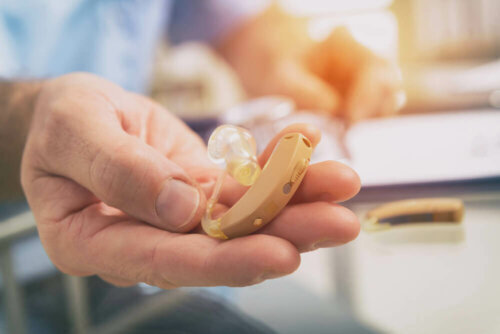International Cochlear Implant Day: Everything You Need to Know

Hearing problems, partial deafness, or loss of hearing are issues that don’t discriminate between children and adults. As such, it can limit people’s life quality in every aspect from socialization to learning, causing mood changes and depression. This is why we have International Cochlear Implant Day, on February 25th.
So, to answer any doubts about this day and the installation of the auditory device, in this article we’re going to talk about what a cochlear implant is, who may need the device, and how it improves people’s lives. Let’s get started!
What’s a cochlear implant?
Cochlear implants are a prosthetic implant or device that allows for partial recuperation of a person’s ability to hear. How? Through transforming acoustic signals into electrical signals that are then directly transmitted into the vestibulocochlear, statoacoustic, or auditory nerve.
The total prosthetic structure consists of two parts:
- Internal: Receptor or stimulator
- External: Microphone, processor, and transmitter or coil
Specifically, specialists place the internal part within the skull, whilst they place the exterior part behind the ear.
In terms of how it works, the microphone captures the sound and sends it to the processors that read, understand, and interpret the signals. Following this, the information arrives at the transmitter and goes to the receptor. In the receptor, the emission cycle for the electric signals that stimulate the auditory nerve is closed.

History of the cochlear implant
The reason why February 25th was chosen as the International Cochlear Implant Day is related to the year 1957 and doctors Charles Eyries and André Djourno. However, we didn’t start to celebrate the event until 2009.
In fact, it all happened in France whilst working to improve patients’ hearing ability when they introduced a copper thread into someone who had a discouraging diagnosis of total deafness. The result? Well, the person was able to capture the language sequence!
This paved the way for the perfected implant that was developed years later. Some of the later advances were by W. House who included a gold electrode in the cochlear implant. Likewise, in Australia, G.M. Clarin inspired more hope for cochlear implant research when he fitted the first for Rod Saunders in 1978.
Read more: Protect Your Hearing: When Was Your Last Check Up?
Who needs a cochlear implant?
The relevance of the cochlear implant – which international organizations want to boost with the slogan “don’t let hearing loss limit you, listen for life” – is based on its use for those who need it.
With that in mind, doctors may suggest a cochlear implant in the following circumstances:
- People with little or no hearing ability: i.e. if there’s no favorable change with a hearing aid. That said, those that notice a change in their perception of sound thanks to a hearing aid aren’t eligible for a cochlear implant.
- If it’s impossible to understand speech: For example, if it’s clear that someone has difficulty understanding speech and communication has largely worsened.
- Older adults with hearing loss: Often, in circumstances where deafness worsens with age and the person loses the possibility of interpretation noise around them.
- People with severe bilateral neurosensorial hearing loss: When hearing loss develops due to serious auditory nerve damage.
Alternatively, another way specialists are able to determine if an individual needs the implant and is able to undergo surgery is to carry out different tests on them. The analysis includes the following:
- Audiometry
- Tomography
- Psychological test
- Magnetic resonance
How the cochlear implant improves life quality
Generally, the intention of International Cochlear Implant day is to reach people that suffer from poor hearing in the hope to improve their life quality. As such, we’ll now tell you how this medical device can help to develop those affected.
Improve learning in children
Specifically, an absence of hearing changes the way infants understand the world and this can slow down their learning. So, with that in mind, the cochlear implant can help improve the internalization of thought, memory, and language.
And although this increase in ability can be slow for those who haven’t heard before, the changes are notable.
Ability to make telephone calls
The possibilities of communication extend to telephone calls as some patients are able to understand language without needing to lip-read for support.
Enjoy music and voices
The experience of listening to all kinds of music and enjoying singers’ voices becomes normal. In turn, the individual’s leisure options increase and they can channel their stress in different spaces, which is great for their emotional health.
Better speech control
There are some incidences in which the cochlear implant isn’t able to help the person recuperate the majority of normal auditory perception. However, a huge benefit of the implant is that they’re better able to control their speech, which in turn means that people around them are able to better understand what they want to express.

Better confidence
The worries people have when it comes to communicating incorrectly or being incoherent with words lessens. As a result, their confidence increases, which affects both behavior and happiness, as well as performance in many activities. There are plenty of reasons why International Cochlear Implant Day is important!
Recuperation of independence
According to the United States National Library of Medicine, the cochlear implant in adult life has an effect on the individual’s independence. In other words, they’re able to do basic activities around social interaction safely, as well as clearly expressing themselves and planning life projects.
You may also be interested in: Micra: the World’s Smallest Non-Surgically Implanted Pacemaker
International Cochlear Implant Day: technology and medicine
In conclusion, International Cochlear Implant Day is a reminder of medical and technological advancements that help improve life quality regardless of the disability.
We recommend that everyone who turns to a cochlear implant as a solution first truly understands the surgery step-by-step. It’s also important to know the associated risks and what the final healing process looks like. Listening is communicating!
All cited sources were thoroughly reviewed by our team to ensure their quality, reliability, currency, and validity. The bibliography of this article was considered reliable and of academic or scientific accuracy.
- De Souza S, Dupas G y Chiari B. Efectos de la implantación coclear en la edad adulta. la Biblioteca Nacional de Medicina de los Estados Unidos. 2018. Disponible en: https://pubmed.ncbi.nlm.nih.gov/30517268/
- Domínguez A, Alegría J y Pérez I. La lectura en los alumnos sordos: aportación del implante coclear. 2011. Disponible en: https://doi.org/10.1174/021037012802238993
- M.Manrique M, Ramos A, Morera C, Cenjor C, Lavilla M, Boleas M y Cervera F. Evaluación del implante coclear como técnica de tratamiento de la hipoacusia profunda en pacientes pre y post locutivos. 2006. Disponible en: https://doi.org/10.1016/S0001-6519(06)78657-5
- Oliveira J. Implante Coclear. Facultad de Medicina de Ribeirão Preto. 2006. Disponible en: https://doi.org/10.11606/issn.2176-7262.v38i3/4p262-272
- Lima A, Bevilacqua M y Alves O. Implante coclear: audición y lenguaje en niños con discapacidad auditiva prelingüística. 2007. Disponible en: http://dx.doi.org/10.1590/S0104-56872007000300008
This text is provided for informational purposes only and does not replace consultation with a professional. If in doubt, consult your specialist.








